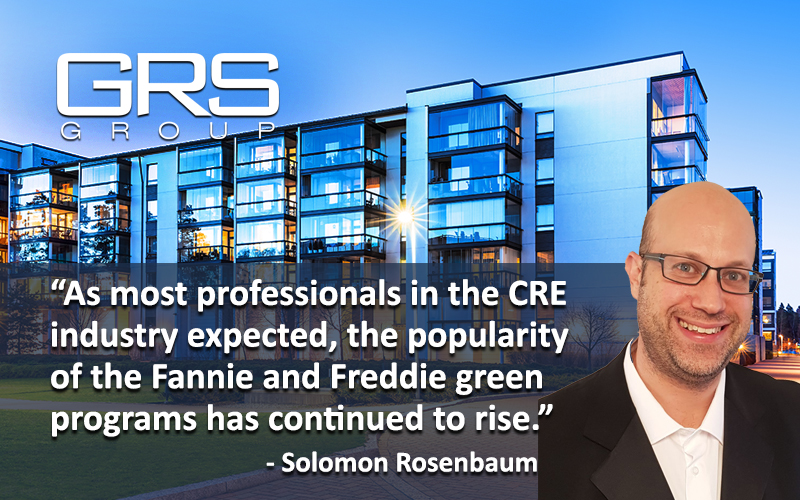
Sol Rosenbaum, PE, CEM, CPMP
Director, Green & Energy Services
(443) 320-0429
[email protected]
As most professionals in the commercial real estate due-diligence world expected, the popularity of the Fannie Mae Green Rewards and Freddie Mac Green Advantage programs has continued to rise. GRS Group saw a steady increase in the workflow through 2017 and the trend has continued through the first half of 2018. Only halfway through Q3 and we are on track to hit yet another internal record.
While guiding our clients through this process, three common pitfalls that have come up on occasion nearly causing delays in the reporting process. In an effort to help streamline the process for your future projects, I am sharing these pitfalls and also the solutions to avoid them.
The most common pitfall is the lack of utility data for all common area and site accounts (usage metered directly to the tenant can be modeled). It is crucial that we receive at least 12 or 13 months of utility data in order to properly analyze the property’s total usage and usage patterns. If there are multiple meters and a single month is missing from one or two of the accounts, then we can make accommodations. However, when there are several months missing or when data for an entire account is missing, we will be unable to continue until this data is provided.
For this reason, it is important to begin collecting the data as soon as the project is engaged so that it can be reviewed for completeness. Occasionally, we run into an issue (particularly on acquisitions) where 12 months of data is simply not available. For these projects, special permission will be required from Fannie Mae and/or Freddie Mac, however, we have worked on projects where less than 12 months of data were accepted.
The second common pitfall is not understanding the ramifications of recent capital expenditure projects. Both programs consider the savings to be from the point of inspection as the baseline and do not give credit for recently finished projects. Late last year, we were involved in a project and there seemed to be a disconnect between the high water usage of the bills and the expected water usage based on the plumbing devices observed during the inspection. When the issue was discussed with management, they detailed the recent installation of the low flow water devices over the past 4-6 weeks! Had they waited just two months to complete that project, they would have easily qualified for the program.
Therefore, we often advise our clients to hold off on any CapEx projects until after the loan closes. Additionally, we make sure that we have full records of the work that was performed particularly in the last three years to understand how this may affect qualification. Keep in mind, CapEx projects can also be used to your advantage. For example, replacing all of the site windows is expensive and rarely chosen as one of the recommendations implemented in order to qualify. However, if the client is already planning to install new windows, they should ensure we have all of the details on this project to get credit for as much energy savings as possible.
Finally, it is important to temper expectations prior to fully engaging in these projects. The prevailing understanding of many borrowers is that almost any property can qualify. While this may be true to some extent, it is important to understand that even if we can recommend enough measures to qualify, it can still be quite cost prohibitive to do so. In order to attempt to avoid such complications, we have implemented a free pre-qualification process. This allows us to collect some initial data from the client and let them know the general expectations for this project.
While it is impossible to give an unequivocal answer as to whether a property will qualify or not without a full review of the data and property inspection, this at least tempers expectations. When we see, for example, a fairly recent property construction with energy star appliances, double pane windows, LED lighting, and low flow plumbing fixtures, we can let them know that the cost to qualify could be fairly high if they are able to reach it at all.
Want to know more about our Green Services and the Fannie Mae or Freddie Mac programs? Have a specific question about a property or want to take advantage of our pre-qualification process? Please be in touch with me and I would be happy to help out.
About GRS Group:
GRS Group is a leading provider of commercial real estate (“CRE”) services worldwide. With offices across the United States, Europe, and affiliates around the globe, GRS Group provides local market knowledge with a global perspective for institutional real estate investors, occupiers and lenders worldwide. The GRS Group team has evaluated and advised on over $1 trillion in CRE transactions.

